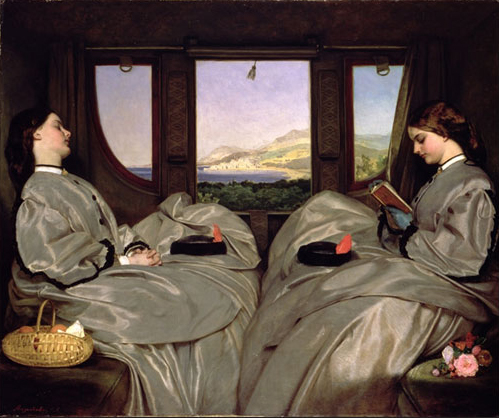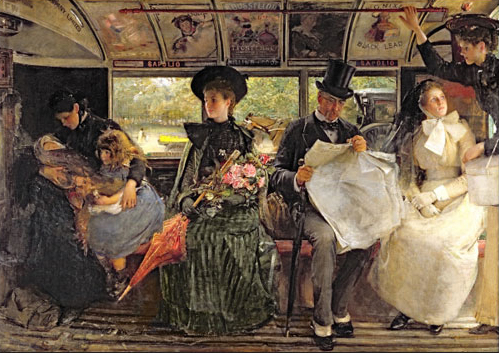8 Reading while travelling
By Simon Eliot
Until recently – certainly until the laptop, mobile phone, and personal stereo took over – travel, and particularly the daily commute, was characterised in buses and trains by people intent on a newspaper, a magazine or a book. We nowadays travel much more frequently, more cheaply, much further, and much faster than our forebears did, though whether to much more purpose and effect is debatable. The coming of the railways, the internal combustion engine, and powered flight transformed and multiplied enforced reading opportunities but, even before these, reading and travel were closely associated.
Riding a horse, unless at a canter or a gallop, could be done with one hand, thus releasing the other to hold a book or a paper. Here is Samuel Pepys riding to Chatham on 3 August 1665 and using reading to flatter an attractive woman:
And so we set out for Chatham – in my way overtaking some company, wherein was a lady, very pretty, riding single, her husband in company with her. We fell into talk, and I read a copy of verses which her husband showed me, and he discommended but the lady commended; and I read them so as to make the husband turn to commend them. (UK RED: 12240 [Tip: hold Ctrl and click a link to open it in a new tab. (Hide tip)] )
More commonly Pepys would use a carriage and, when the woman was not sufficiently attractive, found reading more so. In his diary for 26 October 1664 he records that as he was getting into his carriage that day, ‘an ordinary woman prayed me to give her room to London; which I did, but spoke not to her all the way, but read as long as I could see my book again’ (UK RED: 12140).
Light in the past was always a problem, at home and on the road – and on railways. It was particularly difficult in the blackout in late 1939:
Oh, I have strained my eyes trying to read, and had to give it up in the end. I call it dismal, sitting for half an hour or more in a dark, gloomy carriage, so’s you can’t read; can’t even look at the girls sitting opposite you; can’t see your station. (UK RED: 10144)
Motion sickness can always be a problem for a reader on the move. On 3 December 1832 Fanny Kemble was travelling by coach from Amboy to Delaware in the USA but, to her exasperation, ‘The roads were unspeakable’. She ‘attempted to read, but found it utterly impossible to do so’ (UK RED: 7864).
There were strategies that might help in such circumstances. Hester Thrale observed that:
Apropos to riding in a coach, Perkins told me that he had found out the Secret how to read in a Carriage and would tell it to me, to whom it might be useful; he put a Piece of Paper he said on the Page he was reading, & so moved it when he came to the End of the Line. (UK RED: 23269)
However, there were occasions when, for a less pious person than Elizabeth Fry, an excuse not to read might have come in handy:
We have two Scripture readings daily in the carriage, and much instructive conversation; also abundant time for that which is so important, the private reading of the Holy Scripture. This is very precious to dear Elizabeth Fry, and I have often thought it a privilege to note her reverent ‘marking and learning’ of these sacred truths of divine inspiration. (UK RED: 23124)
Travelling took much time, and books were rather expensive, so careful organisation was necessary to maximise the benefit, as John Marsh recorded on 9 April 1796:
On the next day I went to Canterbury in the diligence [i.e. stage-coach], during w’ch I amused myself with reading part of Voltaire’s ‘Candide’, w’ch having read a great many years ago at Salisbury & almost forgot, I bought the day before in duodecimo. Having dined at the King’s Head I went out & got ‘Caleb Williams’ of w’ch I had heard much & of w’ch I read great part of the 1st vol. in the evening at the King’s Head (where I also supp’d & slept) leaving the 2d. vol of ‘Candide’ to read on my return to London. (UK RED: 7932)
However, travelling also gave opportunities for serendipity, a chance multiplied by the number of stops a mail coach, for instance, had to make (on average once every twelve miles) to replace the horses. On 6 August 1825 Anne Lister
Found on the table at the inn (in no.9, a very nice small parlour with a lodging opening into it), among several other books, Rhodes Peak Scenery, in 4, I think, thin 4to vols, with plates. Read there the account of Bakewell Church, Haddon Hall etc. (UK RED: 3019)
In the railway age bookstalls – many run by W.H. Smiths – could provide the same possibility of a surprise discovery. In the late 1850s Jessie Boucherett
caught sight, on a railway bookstall, of a number of the Englishwoman’s Journal. She bought it, attracted by the title, but expecting nothing better than the inanities usually considered fit for women. To her surprise and joy she found her own unspoken aspirations [regarding women’s employment] reflected in its pages. (UK RED: 4852)
I shall end with a piece of serendipity made possible by the RED site itself. Searching for ‘reading’ and ‘rail’ I came across the following from Charlotte Brontë written in the earlier part of 1845 which, although it has nothing to do with reading while travelling, reveals the author of Wuthering Heights as a down-to-earth and successful investor in railway shares:
There is nothing so uncertain as rail-roads; the price of shares varies continually – and any day a small share-holder may find his funds shrunk to their original dimensions. Emily has made herself mistress of the necessary degree of knowledge for conducting the matter, by dint of carefully reading every paragraph and every advertisement in the news papers that related to rail-roads and as we have abstained from all gambling, all mere speculative buying- in and selling-out – we have got on very decently. (UK RED: 28466)
Click here to return to the beginning of this course and select another essay to read.


